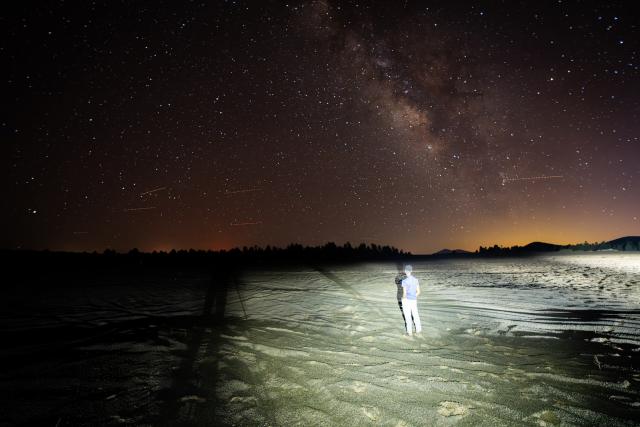David Obajemu ’25 Aspires to Bring Social Change Through Storytelling
November 13, 2023

The immersive media designer says technologies like AR and VR have the potential to create empathy, understanding.
By Jessica Weiss ’05
While scrolling Twitter in 2021, David Obajemu was intrigued to read about a new major at the University of Maryland mixing graphic arts with computer science. “Immersive media design,” or IMD, seemed to be a good fit for the recent transfer student; Obajemu had long practiced various art forms and was increasingly interested in extended reality (XR) technology like augmented and virtual reality.
But the more he looked into it, Obajemu had one hesitation: he didn’t know how to code.
“I was honestly terrified because I don’t have a computer science background,” said Obajemu ’25. “But the professors all said they would help and that I would learn as things went on. And that’s exactly what has happened.”
Two years later, Obajemu now writes code in various programming languages and dominates innovative digital tools and technologies to make his creative visions come to life. He is working towards a Bachelor of Arts in IMD on the “emerging creatives” track, with a focus on telling stories that build empathy and bring to life his experience as a Black man.
“IMD is a perfect spot for me,” said Obajemu about the program.
Born in Nigeria and raised in Maryland, Obajemu has been drawn to the visual arts for as long as he can remember. He began studying graphic design at Montgomery College in 2019, where he focused mainly on digital media, graphic art and photography.
Since transferring to UMD, he has taken advantage of multiple opportunities to grow his skills in immersive media design both inside and outside the classroom. Because IMD is housed in both the College of Arts and Humanities and the College of Computer, Mathematical, and Natural Sciences, Obajemu has learned from faculty with a range of expertise, who he said have gone out of their way to ensure he understands the material.
In IMDM 498A: “Augmented Reality Design for Creatives and Coders,” taught by IMD lecturer Jonathan David Martin, Obajemu worked with classmates to produce two AR projects from start to finish: “New Leaf” encourages users to explore their surroundings and virtually plant and maintain local trees in an immersive AR experience, and “Swish AR” is a competitive AR basketball game.
“To see these come to life was amazing,” he said. “It really showed me I can create anything I want in AR or VR—it’s not just for professionals or those who have years of experience.”
Martin, his professor, said not only did Obajemu gain a high degree of comfort using the technical tools, but he also showed “tremendous growth in his ability to communicate his ideas with passion and confidence.”
“David has taken full advantage of being an IMD major to continue to develop his skills not only as a designer, but as a skilled technical artist and a project leader, as well,” he said.
Last summer, Obajemu began an internship with NASA Goddard Space Flight Center on the GEODES (Geophysical Exploration of the Dynamics and Evolution of the Solar System) team, which is a partnership with UMD that investigates the surfaces of the moon, near-Earth asteroids and the moons of Mars. As an XR designer, he worked to capture and spotlight the team’s projects for publicity and training purposes. He traveled to Flagstaff, Arizona, for a 10-day trip with scientists, where he collected geological data and captured photos and videos of the landscape, which will be used for training. He continues to intern for the team.
He also received support from IMD to attend the XR Brain Jam gathering in New York in July, where his team built a tool that allows users to create a virtual world to tell a story, convey a thought or share an experience. “Woven Worlds” won the award for Most Innovative Product and was featured in the Games for Change Festival.
Obajemu says these extracurricular experiences have shown him the range of potential career paths for those with skills in AR and VR, from game design to museums. For now, Obajemu is using the skills he’s learning as an IMD major to tell stories that he hopes will ignite social change. This focus stems largely from an experience last year when he was racially profiled by police during a routine traffic stop in North Carolina, leading to what Obajemu calls “a traumatizing and terrifying ordeal” of being falsely accused of having drugs in his car and handcuffed at gunpoint. The event left him depressed and anxious, and Obajemu spent months away from school, healing and regaining his strength.
He realized his passion for design could help him process the incident, as well as inform others. Through the IMD New Works Incubator, he began working on a project that showcases the incident with police in an immersive way through poetry and VR. Eventually he hopes it can be a teaching tool for law enforcement and people who don’t identify as Black to learn what it’s like to drive alone as an African American.
“More than music, more than poetry, more than TV shows or video games, I think AR and VR can allow me to bring people into my world and really influence them,” he says. “I feel fortunate to be in this field and I want to use it to bridge the gap between different groups, building empathy and fostering understanding. That’s what drives me.”


